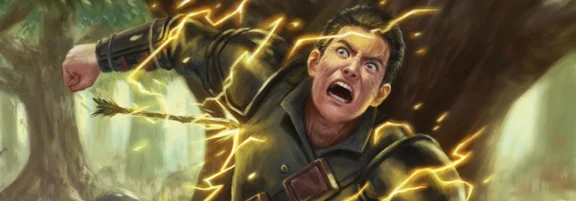We've invited some guest writers to contribute to fabtcg.com for the Skirmish season. Matt di Marco is known for both video and written content, including interviews, articles, and most recently, broadcasting. This is the third article in his five-part Elevating Your Game series.
Elevating Your Game From Casual to Competitive
Part Three: Habits of a Winner
The conscious decision to shift from casual card slinger to competitive gamer is one that will take sacrifices here and there. In parts one and two of this series, I dug into what this major gear shift would entail from an expectations perspective, as well as giving you the blueprints to setting a solid, stable foundation for your ascent through the ranks. All of these are critical to future success, but might not prepare you for some of the slings and arrows you’ll have to dodge while actually playing the tournaments.
Beyond the surface of each win or loss is a series of events that are just as important as the final result. Every turn will influence your trajectory in a given match. Flesh and Blood is already an immensely complex game, and to some of the casual players, excelling at the game can seem daunting. There are so many intricate rules and interactions that require deep understanding that you will inevitably make mistakes and lose an edge. It will surely happen, and it will often enough turn a glimmering win into a festering loss. Developing good habits will gradually enhance your overall play, guiding you past these detrimental occurrences. In this article, I’ll walk you through the habits you should be developing to best deal with and ultimately avoid heartbreaking losses.

Practice Makes (Almost) Perfect
Throw the idealism of perfection out the airlock, because you’re not going to get there. None of the pros play perfectly, and there are many forgotten Fyendal’s Spring Tunic triggers on camera at major events that prove that point. You can’t play perfectly, but you can get close. Striving to approach perfection is the right mindset here, and practice is your best outlet to advance that strategy.
By accepting the fact that perfection is unattainable, and parlaying that into an attitude of passivity, you’re going to harm your chances at success. The fine balance of striving for perfection while being realistic is the right chemistry you need to achieve. Regular practice sessions are a key way to work on that recipe. You can’t be perfect, but you should strive to be.
Regular and extensive practice sessions are a cornerstone of a pro player’s itinerary. Depending on who you ask, the frequency and duration of these sessions may vary. Pro Tour player Daylon Mack is an incessant play-tester, often exceeding ten games a day to master his craft. Established number ones like Matt Rogers and Michael Hamilton have less rigorous routines, but do invest the time well ahead of major events. Given you’re just beginning this journey, any time you can dedicate to practicing Flesh and Blood is already a good amount. Again, everyone is different, and everyone has a different level of sacrifice they are able to make in the name of progress. The important part is understanding that practice is where you discover the marginal or otherwise elusive situations you’ll need to properly navigate to maintain an edge. Round 5 of a ProQuest isn’t the time to be thinking about whether to drop a Pulse of Isenloft in your Arsenal against OTK Viserai. You need to iron out these wrinkles in practice.
When there is nothing at stake, you can truly experiment and try lines of play that may seem unorthodox in your mind. When it comes to winning, there are no points for style. Trying cute plays at an event may pay off and make for good stories, but more often than not you’ll be laying in bed wondering why the hell you took unnecessary risks. Your practice sessions are more than just trying to beat up on the heroes you’re likely to face at a tournament. They’re exercises to develop muscle memory for when the games truly matter. Like a shortstop that spends hours weekly fielding ground balls, you want to get in as many reps as possible to face the most possible situations. Your deck is your home-field advantage, so knowing the way the ball bounces off the dirt eliminates the rare surprises down the line.
My first foray into trying to win a ProQuest had me testing daily for many hours. It became tedious, even annoying at times, as there are only so many Starvo fuses or Viserai Sonata pop-offs you can tolerate on a daily basis. The payoff occurred when one of those outlier scenarios presented itself. A sneaky play that wouldn’t typically arise too often surrounding a Prism mirror and triggers on the stack. Finding the correct window to play a Merciful Retribution ultimately caught my opponent in an improperly sequenced turn that ended their attack prematurely. If it hadn’t been for a few dozen practice games under my belt over the course of a week or two, I wouldn’t have caught the scent of this cheeky play. That minor edge allowed me to regain momentum and win the game, securing myself in the Top 8. That little margin that I discovered in practice translated to an unlikely game win in an important tournament, and ultimately had me Top 8’ing three of the five Pro Quests I attended, scoring a Gold Foil on the way. Regular practice is like sifting through dirt. It’s usually just going through the motions, but you sometimes find gold.

Dealing With Your Misplays
I can (and have) written an entire full-length article delving into this exact topic. The sting of defeat is a pain that can echo over time. It will haunt you, reducing you to a husk of a person recounting the time you “almost won the big one.” Creating healthy habits that address the lingering stench of a misplay is something to work on as you progress on your journey to competitive player status.
I previously mentioned that you can rewatch any major tournament and find multiple times where critical mistakes are made. Excitement, anxiety, overconfidence, or even fatigue can creep their way into your brain, influencing the blunders that you’re going to harp on later. How you deal with these inevitabilities will factor into how much you succeed moving forward. You can learn from it, and not let it cloud future decisions, or you can let it haunt you. Approaching these incidents as lessons is the correct, and healthier avenue.
The best way to view a misplay is that they are inevitable. We already established that you aren’t perfect. Perfection is reserved for Rob Cygul’s hair. You need to realize that given the mountain of factors like fatigue, diet, travel, environment, or even just being annoyed about a movie you saw, you’re going to need to cut through a lot of noise to stay focused. With so much swirling around in your head, it may feel like there are two monkeys in there, but only one banana. It is inevitable that you’re going to get distracted or clumsy and your auto-pilot will cruise you right past a critical play you needed to time immaculately. Getting beyond these blunders is what contributes to consistent success.
When a pro player trips up in a high-stakes game, you’ll often think they didn’t even notice. It is uncommon for a pro player to show signs of tilt when they blow a routine play. They carry on without so much as a grimace. Are they oblivious? Hardly. They most likely immediately recognize their error but are mentally tuned to move past it. Your errors are like luggage. Carrying too much with you doesn’t make for easy travel. Being bogged down by the past will only hold you back, adding to the turbulence you might already be managing in your mind. The best players learn to leave these unfortunate events at the gate, as it really isn’t going to help them in the moment. An emotional response can really derail what you’ve been working for, and devoting too many brainwaves to history leaves you less equipped for the future - and that future is coming at you when you pass priority.
Addressing mistakes is fine, but know the right time and place. You’ll have practice sessions and discussions with your testing team to break down what went wrong and where you let your guard down. Dwelling on a misplay in the midst of a match is incredibly self-destructive. You need to be able to put these kinds of errors in your back pocket and not think about them until it is productive to do so. Focus on the task at hand. You may have made the game more difficult to win, but most errors aren’t game-ending. A missed Tunic trigger isn’t Armageddon, no matter how earth-shattering it may feel. Once you’ve made the habit of putting misplays into perspective, you’ll be better suited to shrug them off as they occur, and learn from them when the time is right.

Find Center
Achieve your own Zen State. That is to say, work on keeping your mindset healthy. Perspective is everything, so be sure that you’re not too hard on yourself. Reaching this blissful state of mind isn’t about singing Kumbaya to a rhythmic drum beat, it’s about understanding where you are in the grander scheme. At the risk of getting a little too existential, I want you to take a bird’s eye view of your own life, specifically your Flesh and Blood career. Where you are today, where you were a month ago, and where you’d like to ultimately be. Set your goals, but be mindful that accomplishing those goals isn’t a linear path.
Your progress to being a competitive threat will come with unpredictable hurdles, detours, and hindrances. What they shouldn’t be considered as are failures. Every misplay, every loss, and every tournament scrub-out is only a failure if you approach it as such. In every one of these shortfalls lies an opportunity; a chance at improvement will always lurk in the muck of another defeat. The work you put in won’t always yield an equitable reward, so you’ll need to be prepared for that. The macroscopic look at your Flesh and Blood path will show you that, on the whole, you’ve made progress. Revel in that, and appreciate that you’ve made strides. The hard work you’re investing won’t always mean a steady leap forward, but understanding that progress is measured over larger chunks of time will give you some healthy perspective and appreciation for your efforts.
Just a month ago you were going 2-4 at the local ProQuest. Now you’re going 4-2 and making fewer mistakes. Focussing on one bad tournament will blind you to the fact that overall you’re crushing it. A healthy mindset is vital to keeping you motivated and armored against the soul-crushing defeats that undoubtedly will try to sour your experience. Work on developing healthier mental habits to better insulate yourself from the myriad of little things that gnaw at your brain. That way the next time you waltz right past a Tunic trigger, your mind is locked in on recovery and adaptation, not self-pity and wallowing.
In part four of the series, I will explore where you can gain marginal edges over the lesser prepared field, such as sideboarding, meta-analysis, and establishing a game plan.
Matt di Marco is a competitive Flesh and Blood player and author of content relating to gameplay and strategy. The opinions expressed in the above article are his own and do not necessarily reflect the views of Legend Story Studios.